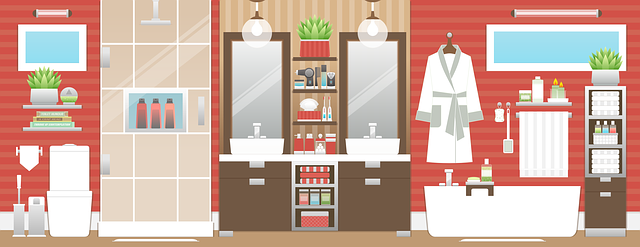Choosing the right bathroom flooring involves selecting water-resistant materials to combat high-moisture environments. Popular options include luxury vinyl, ceramic, and porcelain tiles for their slip-resistant surfaces, easy maintenance, and durability. Natural stone like marble offers a luxurious aesthetic but requires extra care to prevent water damage. Luxury vinyl is highlighted as a versatile, waterproof, and slip-resistant option that mimics the look of traditional materials without sacrificing durability or ease of installation. Emphasis is placed on waterproof bathroom flooring, slip-resistant options, and the aesthetic versatility of these materials.
When it comes to choosing flooring for your bathroom, water resistance is a must. This essential factor ensures your space remains dry and comfortable, preventing mold growth and prolonging the life of your floor. In this guide, we explore top bathroom flooring options tailored to meet your needs: from luxury vinyl’s waterproof appeal and slip-resistant surface, to traditional tile choices like ceramic and porcelain, as well as the elegance and maintenance considerations of natural stone and marble.
- Understanding Water-Resistant Flooring Needs for Bathrooms
- Luxury Vinyl: A Popular Choice for Waterproof and Slip-Resistant Floors
- Traditional Tile Options: Ceramic and Porcelain for Bathroom Durability
- Natural Stone and Marble: Exquisite but High Maintenance Bathroom Flooring
Understanding Water-Resistant Flooring Needs for Bathrooms
When it comes to bathroom flooring, water-resistant materials are a must. This is because bathrooms are high-moisture environments, with constant exposure to water from showers, baths, and sinks. Understanding the specific needs of your bathroom flooring is crucial to ensuring longevity and comfort.
Waterproof bathroom flooring options like luxury vinyl and ceramic or porcelain tiles are popular choices due to their slip-resistant surfaces and ease of maintenance. Natural stone flooring, such as marble, also offers a luxurious look but requires more upkeep to prevent water damage. Proper installation techniques, including sealed joints and waterproof underlayments, are essential for any water-resistant flooring in bathrooms, ensuring your investment lasts for years to come.
Luxury Vinyl: A Popular Choice for Waterproof and Slip-Resistant Floors
When it comes to choosing bathroom flooring options, many homeowners opt for luxury vinyl as a popular and effective solution for both waterproof and slip-resistant surfaces. This versatile material offers an extensive range of designs imitating ceramic bathroom tiles, porcelain bathroom tiles, or even natural stone flooring, such as marble bathroom floors, without compromising on durability.
Luxury vinyl is highly resistant to water absorption, making it ideal for humid bathroom environments. Its slip-resistant properties ensure safety and comfort, reducing the risk of accidents. Unlike traditional ceramic or porcelain tiles that can become cold and slippery when wet, luxury vinyl provides a warm and secure surface. This flooring option is easy to install, maintain, and clean, making it a practical choice for bathroom renovations.
Traditional Tile Options: Ceramic and Porcelain for Bathroom Durability
Traditional tile options like ceramic and porcelain are popular choices for bathroom flooring due to their durability and water resistance. Ceramic tiles, known for their toughness and chip-resistive nature, are a cost-effective option that offers a wide array of colors and designs. Porcelain tiles, on the other hand, are even more resistant to moisture, stains, and scratches, making them ideal for high-traffic bathrooms. These materials are not only slip-resistant but also easy to clean, maintaining their aesthetic appeal over time.
When considering bathroom flooring options, luxury vinyl and natural stone like marble are other excellent choices that mimic the look of ceramic and porcelain while providing added benefits. Vinyl flooring is waterproof and comfortable underfoot, making it suitable for areas prone to water splash or leaks. Marble bathroom floors offer a luxurious and timeless appearance, but they require more maintenance and can be slippery when wet if not treated properly, which is something to keep in mind when choosing slip-resistant bathroom flooring.
Natural Stone and Marble: Exquisite but High Maintenance Bathroom Flooring
Natural Stone and Marble bring an undeniable touch of elegance and luxury to any bathroom space. These timeless materials are popular choices for those seeking high-end, visually appealing bathroom flooring options. However, their beauty comes with a caveat – they require meticulous care and maintenance due to their porosity. Penetrating moisture can cause stains and damage over time, making them less ideal for the humid bathroom environment without proper sealing and regular cleaning.
While natural stone and marble offer exquisite aesthetics, they might not be the best option when it comes to slip-resistant or waterproof bathroom flooring. Their smooth surfaces can become slippery when wet, posing potential safety hazards. This is particularly important in bathrooms where accidents are more likely to occur. As such, those considering these materials may want to explore alternative options like luxury vinyl or ceramic/porcelain tiles, which offer better water resistance and slip-resistant properties without compromising on style.
When selecting flooring for bathrooms, prioritizing water resistance and slip-resistance is key to creating a safe and stylish space. Depending on your preference and budget, luxury vinyl offers an affordable, waterproof solution with added slip-resistance. For a classic look, ceramic and porcelain tiles provide superior durability, while natural stone and marble exude elegance but demand higher maintenance. Understanding these bathroom flooring options equips homeowners to make informed decisions, ensuring both functionality and aesthetics in their wet environments.
